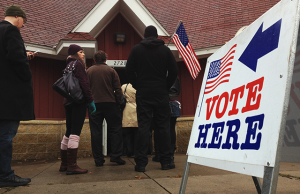SALT LAKE CITY — The Utah Legislature is getting a head start on redistricting voting districts in 2021 while the Better Boundaries Initiative, which would require an independent commission to decide these districts, has been approved for the November ballot.

After the census in 2020, the Utah Legislature will determine redistricting, the process of reassigning political boundaries within the state.
The Legislature is responsible for approving the districts and deciding on the method of the redistricting process. The Government Operations Interim Committee considered redistricting in a legislative interim meeting May 17.
During the 2011 redistricting process, many groups protested, saying that the Republican Party heavily influenced and controlled the process. According to a Better Boundaries news release, the Better Boundaries Initiative — which would require an independent redistricting committee — has been approved for the November ballot. Initiative supporters want to remove partisanship from the redistricting process.
The Legislature’s Associate General Counsel Thomas Vaughn told lawmakers that although redistricting would not officially occur until 2021, “the redistricting process has already begun.” There are many decisions that must be made before that point. These decisions included setting standards to ensure fair and quality redistricting to avoid lawsuits.
Vaughn told the committee of the need to accurately balance the population between districts to maintain equal voting power. One of the standards used in 2011 during the previous redistricting was that officials would only tolerate a 0.2 percent deviation between the largest and smallest districts in the state. In the last redistricting, the Utah Legislature kept that deviation at 0.0001 percent.
Vaughn also said race must be carefully navigated, specifically by attempting to ignore it in the redistricting process. The Legislature is not allowed to base redistricting on racial demographics.
Rep. Norm Thurston, R-Provo, asked what counted as “race.” Vaughn responded that race refers to ethnicity and even linguistic minorities in addition to race.
Vaughn said the following traditional redistricting principles are important: While not required, districts should be compact and continuous to avoid suspicion of manipulation; in addition, the preservation of political subdivisions and communities of interest should be valued. Vaughn said respecting communities of interest is “hard.” … What my idea of what a community of interest is might be very different than yours.” In previous redistricting, the cores of prior districts have been preserved. Finally, lawmakers have traditionally tried to keep in mind the protection of the incumbent.
Lawmakers heard about about recent U.S. Supreme Court cases involving political gerrymandering, which could apply more restrictions and policies on Utah’s redistricting process.




